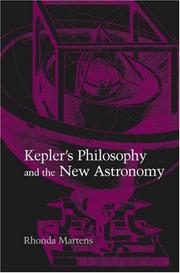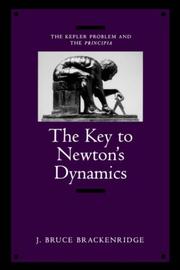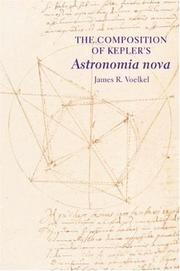| Listing 1 - 3 of 3 |
Sort by
|

ISBN: 1282458485 9786612458484 1400831091 9781400831098 0691050694 9780691050690 9781282458482 Year: 2000 Publisher: Princeton, N.J. : Princeton University Press,
Abstract | Keywords | Export | Availability | Bookmark
 Loading...
Loading...Choose an application
- Reference Manager
- EndNote
- RefWorks (Direct export to RefWorks)
Johannes Kepler contributed importantly to every field he addressed. He changed the face of astronomy by abandoning principles that had been in place for two millennia, made important discoveries in optics and mathematics, and was an uncommonly good philosopher. Generally, however, Kepler's philosophical ideas have been dismissed as irrelevant and even detrimental to his legacy of scientific accomplishment. Here, Rhonda Martens offers the first extended study of Kepler's philosophical views and shows how those views helped him construct and justify the new astronomy. Martens notes that since Kepler became a Copernican before any empirical evidence supported Copernicus over the entrenched Ptolemaic system, his initial reasons for preferring Copernicanism were not telescope observations but rather methodological and metaphysical commitments. Further, she shows that Kepler's metaphysics supported the strikingly modern view of astronomical method that led him to discover the three laws of planetary motion and to wed physics and astronomy--a key development in the scientific revolution. By tracing the evolution of Kepler's thought in his astronomical, metaphysical, and epistemological works, Martens explores the complex interplay between changes in his philosophical views and the status of his astronomical discoveries. She shows how Kepler's philosophy paved the way for the discovery of elliptical orbits and provided a defense of physical astronomy's methodological soundness. In doing so, Martens demonstrates how an empirical discipline was inspired and profoundly shaped by philosophical assumptions.
Astronomy. --- Kepler's laws. --- Kepler laws --- Kepler's laws of planetary motion --- Planetary motion, Kepler's laws of --- Planetary theory --- Planets --- Orbits

ISBN: 1282355007 9786612355004 0520916859 0585375828 9780520916852 0520200659 9780520200654 0520202171 9780520202177 9781282355002 9780585375823 Year: 1996 Publisher: Berkeley, CA : University of California Press,
Abstract | Keywords | Export | Availability | Bookmark
 Loading...
Loading...Choose an application
- Reference Manager
- EndNote
- RefWorks (Direct export to RefWorks)
While much has been written on the ramifications of Newton's dynamics, until now the details of Newton's solution were available only to the physics expert. The Key to Newton's Dynamics clearly explains the surprisingly simple analytical structure that underlies the determination of the force necessary to maintain ideal planetary motion. J. Bruce Brackenridge sets the problem in historical and conceptual perspective, showing the physicist's debt to the works of both Descartes and Galileo. He tracks Newton's work on the Kepler problem from its early stages at Cambridge before 1669, through the revival of his interest ten years later, to its fruition in the first three sections of the first edition of the Principia.
Kepler's laws. --- Celestial mechanics. --- Gravitational astronomy --- Mechanics, Celestial --- Kepler laws --- Kepler's laws of planetary motion --- Planetary motion, Kepler's laws of --- Astrophysics --- Mechanics --- Planetary theory --- Planets --- Orbits --- Celestial mechanics --- Kepler's laws --- Astronomy --- Newton, Isaac --- 1600s. --- academic. --- analysis. --- biographical. --- cambridge. --- centrifugal force. --- conservation of motion. --- cultural context. --- curvature. --- descartes. --- famous person. --- famous scientist. --- galileo. --- historical. --- history buff. --- kepler problem. --- laws of motion. --- mathematics. --- newton. --- newtons dynamics. --- outer space. --- physics. --- planetary motion. --- planets. --- principia. --- scholarly. --- scientific. --- scientist. --- true story.

ISBN: 0691007381 9780691007380 0691224013 Year: 2001 Publisher: Princeton (N.J.) : Princeton university press,
Abstract | Keywords | Export | Availability | Bookmark
 Loading...
Loading...Choose an application
- Reference Manager
- EndNote
- RefWorks (Direct export to RefWorks)
This is one of the most important studies in decades on Johannes Kepler, among the towering figures in the history of astronomy. Drawing extensively on Kepler's correspondence and manuscripts, James Voelkel reveals that the strikingly unusual style of Kepler's magnum opus, Astronomia nova (1609), has been traditionally misinterpreted. Kepler laid forth the first two of his three laws of planetary motion in this work. Instead of a straightforward presentation of his results, however, he led readers on a wild goose chase, recounting the many errors and false starts he had experienced. This had long been deemed a ''confessional'' mirror of the daunting technical obstacles Kepler faced. As Voelkel amply demonstrates, it is not. Voelkel argues that Kepler's style can be understood only in the context of the circumstances in which the book was written. Starting with Kepler's earliest writings, he traces the development of the astronomer's ideas of how the planets were moved by a force from the sun and how this could be expressed mathematically. And he shows how Kepler's once broader research program was diverted to a detailed examination of the motion of Mars. Above all, Voelkel shows that Kepler was well aware of the harsh reception his work would receive--both from Tycho Brahe's heirs and from contemporary astronomers; and how this led him to an avowedly rhetorical pseudo-historical presentation of his results. In treating Kepler at last as a figure in time and not as independent of it, this work will be welcomed by historians of science, astronomers, and historians.
Kepler's laws --- Kepler, Johannes, --- Kepler's laws. --- 53 <09> --- 53 <09> Physics--Geschiedenis van ... --- Physics--Geschiedenis van ... --- Kepler, Johannes. --- Kepler, Johannes --- Astronomia Nova. --- SCIENCE / History. --- Argonauts. --- Aristarchus. --- Book of Nature. --- Bürgi, Joost. --- Columbus, Christopher. --- Counter-Reformation. --- Delambre. --- Dionysius the Areopagite. --- Eriksen, Johannes. --- Eudoxus. --- Fabricius, Johannes. --- Frankfurt. --- Geminus. --- Gordian knot. --- Gruppenbach. --- Heraclides. --- Hercules. --- Hipparchus. --- Jupiter. --- Koestler, Arthur. --- Limnaeus, Georg. --- Lucan, Civil War. --- Magellan. --- Marius, Simon. --- Mars. --- Marägha school. --- Melanchthon, Philipp. --- Mercury. --- Mira Ceti. --- Newtonian synthesis. --- Oswald, Johannes. --- Peucer, Caspar. --- Posidonius. --- Ptolemy. --- Pythagoras. --- Pythagoreans, secrecy of. --- Rhodius, Ambrosius. --- Saturn. --- Seleucus. --- area law. --- conchoid. --- earth. --- epicyclic distance model. --- equant. --- geo-heliocentrism. --- index of prohibited books. --- logos. --- nova of 1604. --- optical equation. --- peer review. --- physical equation. --- rhetoric. --- scholasticism. --- Kepler, Johannes, - 1571-1630. - Astronomia nova --- Kepler laws --- Kepler's laws of planetary motion --- Planetary motion, Kepler's laws of --- Planetary theory --- Planets --- Orbits
| Listing 1 - 3 of 3 |
Sort by
|

 Search
Search Feedback
Feedback About UniCat
About UniCat  Help
Help News
News